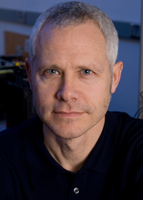Keneth M. Murphy, MD, PhD

Kenneth M. Murphy, M.D., Ph.D., is professor of pathology and immunology, co-head of the Division of Immunology in the Department of Pathology and Immunology, program head for the Immunology Program, and a Howard Hughes Medical Institute Investigator since 1997.
Known for insightfulness, imagination and focus, he has made diverse and significant contributions to science, often bringing novel technologies developed in his laboratory to bear on the important questions he identifies. He is helping to chart his field’s future course through his extraordinary mentoring of the next generation of scientists, and is the author of the textbook Janeway’s Immunobiology.
Murphy earned a bachelor’s degree from Rice University in 1978 and a combined M.D./Ph.D. degree in 1984 from Johns Hopkins University. He then completed his postdoctoral fellowship in molecular immunology and a pathology residency at Washington University. As a postdoctoral scholar, he generated one of the first TCR transgenic mice to facilitate the study of T-cell biology — a model still widely used around the world. He joined the Washington University faculty in 1990 and became a professor in 1999.
In his early work, Murphy established a central paradigm in understanding immune responses by showing that cytokines produced by cells of the innate immune system direct the cell lineage determination of the adaptive immune system’s cells. The discovery provided not only important basic insights into cellular immune responses but also significant translational insight into allergy, autoimmunity and immunodeficiency. Murphy has recently expanded his interest to transcription factors directing the development of tissues and specific cell types and has made important contributions in that arena. Using a bioinformatics approach, he has, among other achievements, identified two transcription factors that regulate two different macrophage/dendritic cell subsets — extremely important findings that will have a major impact on immunology and developmental biology.




